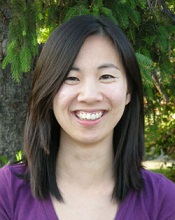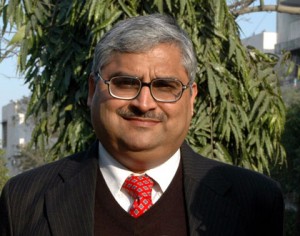31 August 2010
WASHINGTON—Pallava Bagla and Roberta Kwok have won the American Geophysical Union’s 2010 journalism awards:
Bagla will receive the David Perlman Award for Excellence in Science Journalism—News for his articles on the impact of climate change on Himalayan glaciers. The first of his two articles “No Sign of Himalayan Melt Down, Indian Report Finds”, published in the journal Science, explores dissent among glaciologists regarding the claim by the United Nations Intergovernmental Panel on Climate Change (IPCC) that Himalayan glaciers would imminently disappear. The second article, “Himalayan Glacier Deadline ‘Wrong’ “, published by BBC News, reports on an apparent typographical error in the IPCC claim which appears to explain the panel’s controversial, 300-year acceleration of when Himalayan glaciers are expected to vanish.
Kwok will receive the Walter Sullivan Award for Excellence in Science Journalism—Features for her article in the journal Nature, “The Rock That Fell To Earth”. The article recounts the tale of an asteroid that was detected in space and then tracked by many earth scientists and civilians, some of whom ultimately retrieved bits of the extraterrestrial intruder from the desert in Sudan where it crashed.
The Perlman Award recognizes work published with deadline pressure of one week or less. The report of the Perlman Award selection committee applauds Bagla’s articles for addressing “a very serious issue in the earth sciences. His articles serve as a reminder to journalists to question sources, to think harder about the agendas and ideas of those people about whom they are reporting, and to stop the steamroller of opinions or ideas when the facts just don’t back them up. Although Bagla’s articles reveal embarrassing foibles of scientists, ultimately they also illustrate science’s ability to self-correct.”
The first of Bagla’s winning articles, which was published on November 13, 2009, may be read online.The second, published on December 5, 2009, is available at BBC online. Bagla is a correspondent for Science, a science editor for New Delhi Television in New Delhi, India, and a book author — his latest book is “Destination Moon: India’s Quest for Moon, Mars and Beyond”. He also freelances stories to BBC and other media outlets, and contributes photographs to Corbis images.
The Sullivan Award recognizes work published with lead time of more than one week. Regarding Kwok’s article, the Sullivan Award selection committee commended that it “explains how studying asteroids might provide clues about how many planets, including our own, may have formed … It makes AGU science extremely accessible, even fun, and is the kind of article that would encourage the interest of young men and women toward studying fields that AGU supports. Kwok did a wonderful job of weaving in scientific detail, with a fast-paced and thrilling tale of an unusual opportunity in planetary science. The event itself was remarkable and her chronicling of the tale was equally as unique.”
Furthermore, the committee noted that “Kwok is a young journalist and was just an intern at Nature when she wrote the piece, impressing judges with the maturity of her work and her potential to become one of our leading science writers …” Kwok’s article, which was published online on March 25, 2009, can be read at nature.com
In a break from the past, the AGU journalism awards will be presented this year at the 2010 AGU Fall Meeting (December 13–17, 2010) in San Francisco. Details of where and when the ceremony is to take place have yet to be finalized. When they are, they will be provided in future media advisories about the meeting.
AGU’s Sullivan and Perlman Awards are named for Walter Sullivan, late science editor of The New York Times, and David Perlman, science editor of the San Francisco Chronicle, respectively. Each award consists of a plaque and a $2,000 stipend.
AGU is the largest organization of Earth and space scientists, with more than 58,000 members worldwide. One of its objectives is to encourage excellence in reporting science news to the general public through journalism awards, mass media fellowships, communications workshops for scientists, and other programs.
Nominations for the 2011 Sullivan and Perlman Awards are welcome from all news media, except books, from any country, and in any language (with English translation). See the information and the official statement of rules.
AGU Contact:
Maria-José Viñas, +1 202 777 7530, [email protected]
Pallava Bagla: [email protected] or +91 11 2271 2896
Note: Bagla will be traveling in China from 31 August to 8 September, and he will not have regular access to his email or phone during this time.
Roberta Kwok: [email protected] or +1 650 513 1664

